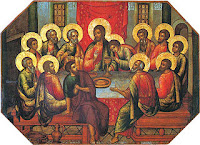
As we grow and age, I think each one of us evolves as a complex aggregate of our relationships, experiences and attitude. For many of us, it is very hard to give up some of the things we pick up from our experiences early in life. My own religious background involves early learning from the Church of South India (C.S.I), and later experiences from the Episcopal Church in the United States of America (ECUSA).
My early years were spent living a fairly idyllic life in Bangalore, India. My family was anchored in the C.S.I, with over nine generations of clergy, doctors and other close involvement with the Anglican Church. I was confirmed at the beautiful St. Mark's Cathedral in Bangalore and have many fond memories of St. Mark's and St. John's Church, which I attended later. The Easter season in particular brings back some great memories. Growing up, Easter sunrise service was truly something to be anticipated with much excitement. I can remember walking in the dark to church to attend a happy time of rejoicing and fellowship.
Outside the church, anyone growing up in the India of the 1970s and 1980s lived in a fairly hierarchical society. Older people, teachers and family were all respected; and part of growing up was to learn how to address people with the correct deference and respect. People had their place in society; and for someone in the upper middle class, things were stable, and life went on without too much change.
Inside the church, pastors in established mainstream churches were especially high up on the totem pole. Clergy in the C.S.I commanded significant respect and had quite a bit of clout. After all, due to early mission investment, along with churches, the C.S.I ran several schools, hospitals, retirement homes and other outreach initiatives.
 So a pastor could influence sought after admission into top notch English-medium C.S.I schools and provide a ticket to a fantastic education. No surprise then, that clergy were usually simultaneously high powered CEOs running a church and its ancillary non-profit
So a pastor could influence sought after admission into top notch English-medium C.S.I schools and provide a ticket to a fantastic education. No surprise then, that clergy were usually simultaneously high powered CEOs running a church and its ancillary non-profitbusinesses.
Nowadays, several decades later, and on the other side of the world, my church home is St. Barnabas', within the ECUSA. Set up after the revolutionary war, the ECUSA deliberately modeled the new nation and set up a fairly democratic governance structure. For example, a central Diocese has to depend on the largesse of its member churches for contributions. Also, clergy in the Episcopal Church U.S.A just don't seem to get the same adulation as their counterparts in the C.S.I. So, some memories die hard, including the image of pastor-as-high-powered-CEO.
So, that's why this Easter season came with a shock for me. Attending the Easter Vigil service at St. Barnabas with family, there was a ritual foot washing. I can surely say seeing two pastors on their knees washing the feet of their congregation will shock any C.S.I member, and perhaps members of other churches as well.
It's pretty shocking at many levels.
First of all, seeing people who are CEO-equivalents on their knees is shocking.

Then, the whole business of touching someone's feet is pretty shocking. After all, in the East, feet are considered dirty, and one of the worst insults one can levy at another is to either threaten to, or actually hit them with footwear.
Finally, there's the positional insult. How can grownups be in the business of washing the feet of younger people and kids? That's turning the totem pole upside down.
All very shocking indeed. So, why this roiling madness that is bound to upset the status quo and create chaos in the world?
As it turns out, we can attribute this turmoil to the creator and author of our faith - Jesus, the Christ. He's the one who left us with the new mandate or commandment at this time. From Wikipedia,
Most scholars agree that the English word Maundy in that name for the day is derived through Middle English and Old French mandé, from the Latin mandatum, the first word of the phrase "Mandatum novum do vobis ut diligatis invicem sicut dilexi vos" ("A new commandment I give unto you, That ye love one another; as I have loved you"), the statement by Jesus in the Gospel of John 13:34 by which Jesus explained to the Apostles the significance of his action of washing their feet. The phrase is used as the antiphon sung during the "Mandatum" ceremony of the washing of the feet, which may be held during Mass or at another time as a separate event, during which a priest or bishop (representing Christ) ceremonially washes the feet of others, typically 12 persons chosen as a cross-section of the community.
As it turns out, our "radical" clergy are simply emulating Jesus' example of servant leadership with their foot washing. So, if you haven't attended one of these services you absolutely cannot miss it next year. You will be treated to hauntingly beautiful music, a service conducted in exquisite solemnity, and you will witness the shocking example of Jesus still at work more than 2000 years later, turning the world's hierarchy upside down through the Episcopal Church and the clergy at St. Barnabas'.
Truly, a shocking mandate to love.
